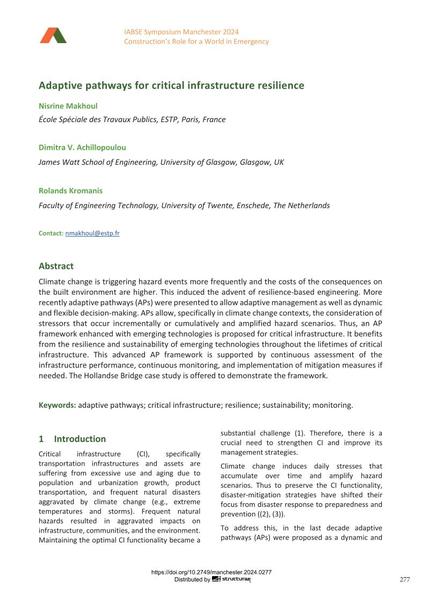Adaptive pathways for critical infrastructure resilience

|
|
|||||||||||
Détails bibliographiques
| Auteur(s): |
Nisrine Makhoul
(École Spéciale des Travaux Publics, ESTP, Paris, France)
Dimitra V. Achillopoulou (James Watt School of Engineering, University of Glasgow, Glasgow, UK) Rolands Kromanis (Faculty of Engineering Technology, University of Twente, Enschede, The Netherlands) |
||||
|---|---|---|---|---|---|
| Médium: | papier de conférence | ||||
| Langue(s): | anglais | ||||
| Conférence: | IABSE Symposium: Construction’s Role for a World in Emergency, Manchester, United Kingdom, 10-14 April 2024 | ||||
| Publié dans: | IABSE Symposium Manchester 2024 | ||||
|
|||||
| Page(s): | 277-285 | ||||
| Nombre total de pages (du PDF): | 9 | ||||
| DOI: | 10.2749/manchester.2024.0277 | ||||
| Abstrait: |
Climate change is triggering hazard events more frequently and the costs of the consequences on the built environment are higher. This induced the advent of resilience-based engineering. More recently adaptive pathways (APs) were presented to allow adaptive management as well as dynamic and flexible decision-making. APs allow, specifically in climate change contexts, the consideration of stressors that occur incrementally or cumulatively and amplified hazard scenarios. Thus, an AP framework enhanced with emerging technologies is proposed for critical infrastructure. It benefits from the resilience and sustainability of emerging technologies throughout the lifetimes of critical infrastructure. This advanced AP framework is supported by continuous assessment of the infrastructure performance, continuous monitoring, and implementation of mitigation measures if needed. The Hollandse Bridge case study is offered to demonstrate the framework. |
||||
| Mots-clé: |
durabilité
|
||||
